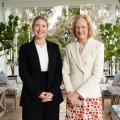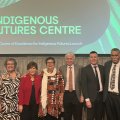Ecuadorian-born UQ postgraduate student Maria Belen Andrade has seen first hand the implications of a poor water supply.
Now she has turned to academic study to help improve her homeland’s access to the precious resource.
Ms Belen Andrade joins a small cohort of students from across the globe enrolled in the Master of Integrated Water Management.
The course is run by the International WaterCentre, a joint venture between The University of Queensland, Monash University, The University of Western Australia and Griffith University.
Ms Belen Andrade realised her calling while completing an internship in South America.
“In the summer of 2002 I went to work in a dairy farm and it did not rain at all during the four months I was there. There was not even water for the people who were working there,” she said.
“They had to walk four kilometres to fetch water for drinking purposes and take all their clothes there to do the washing.”
Upon finishing her undergraduate studies, Ms Belen Andrade worked as a volunteer in Servicio Ignaciano de Voluntariado (SIGVOL) where she built houses in poor slums in Guayaquil, Ecuador.
“The people who lived there did not have access to water or sanitation,” she said.
“We were living in the school of that slum and we also had to buy water from the water tank as all the people from that village did.
“It really struck me how people survived with so little water.”
Ms Belen Andrade said the Master of Integrated Water Management course allowed her to see water through a number of different lenses.
“We have learned to see water through the lens of governance, through the lens of community development, through the lens of ecology, through the lens of project management and through the lens of its strong linkage to sanitation,” she said.
Fellow postgraduate student Shafaq Masud, from Pakistan, also had a life-changing experience that led her to the Master of Integrated Water Management.
While working for an NGO in Pakistan, Ms Masud undertook work experience where she helped develop capacity building training programs.
The programs were established to produce a cohort of individuals who have efficient leadership skills to influence policies and decision-making processes that are more sustainable and environmentally sound.
As part of the course, Ms Masud arranged a field visit to a remote area in Sindh, one of the four provinces of Pakistan.
“This was my first time to visit such an area and to see the one classroom building as the only foundation to an education opportunity for such an impoverished community, which was a real eye-opener,” she said.
“This incident brought in a new spirit that made me decide that I would eventually want to work with and for the communities and that meant that I needed to learn more about the processes and methodologies involved in designing projects and implementing projects for grass roots impact.
“The Integrated Water Management course provides such an opportunity with its community development course and its broad focus on development studies for the developing world.”
Postgraduate student Phuong Lien Tran, from Vietnam, said all of the students enrolled in the course came from different backgrounds, yet had one thing in common: an appreciation of the importance of water.
“Working in an interdisciplinary team is a very important skill for my future career,” Ms Lien Tran said.
“Moreover, the program is designed through problem-based learning, case-study applications, including many field trips, workshops and conferences, and is a practical style of study.
“Attending the International Riversymposium and Queensland Landcare Conference as a part of the program gave me a chance to meet a great number of people working in water management from a wide range of backgrounds.”
The Master of Integrated Water Management is offered over three semesters and can be completed in 12 or 18 months. The program is available full-time and part-time.
Upon graduation, students receive a joint degree from The University of Queensland, Monash University, Griffith University and the University of Western Australia.
Media: Eliza Plant at UQ Communications (07 3365 2619)




